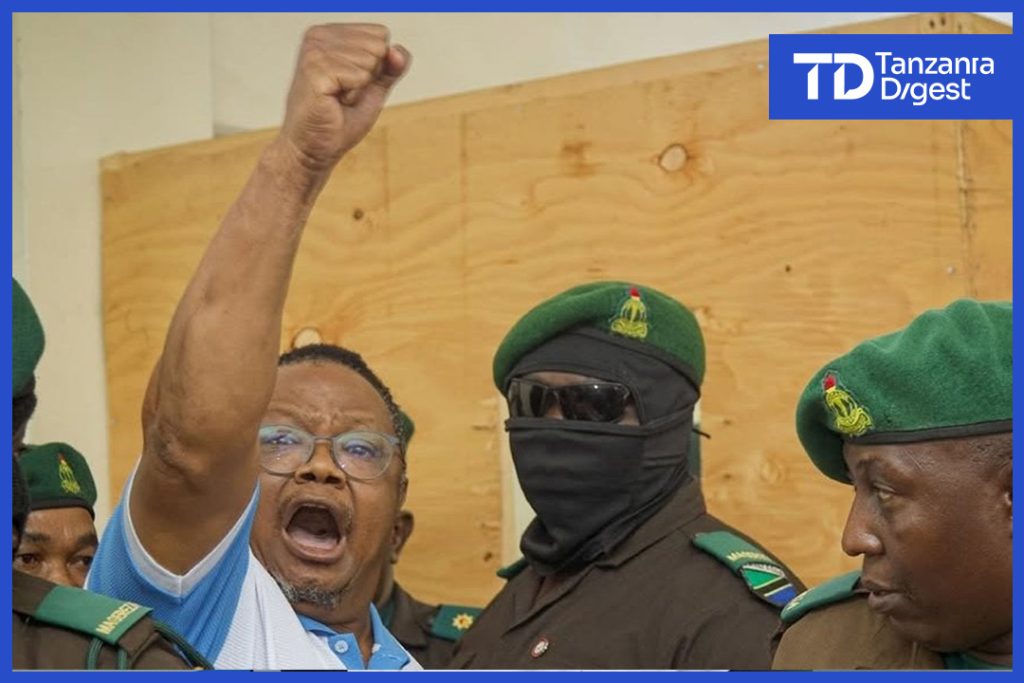After deciding to defend himself, Tundu Antipas Lissu, said through his lawyers that all his prison rights that were deprived from him on frivolous and vexatious grounds that he was an insurgent have been restored.
His worship, exercise and to consult his lawyers in private have been restored he went on to declare:
“…Baada ya kuzungumza
mazoezi kwenye uwanja wa
Mahakamani juu ya
ukiukwaji wa haki zangu
mpira kama wafungwa
kama mfungwa gerezani;_ wengine na
“Sasa naweza kuonana na
Sasa naweza kupata huduma
mawakili wangu na kuzumza ya kiroho siku za ibada”
faragha,
Bila kupigania haki zetu hatutazipata
Tusikate tamaa.
“I demanded it
I got it!
You don’t
demand it, you
don’t get it!”
ALUTA CONTINUA.”
What is at stake in the Tundu Lissu legal matter?
The legal battle surrounding Tundu Lissu, Tanzania’s opposition leader, represents a critical juncture for the nation’s democracy, rule of law, and human rights. His recent declaration—“I demanded it and got it. If you don’t demand it, you don’t get it!”—follows the restoration of his prison rights after a forceful courtroom protest. Below is a structured analysis of what is at stake:
⚖️ 1. Judicial Independence & Fair Trial Rights.
– Prison Rights Restoration:
Lissu regained private legal consultations, worship access, and exercise facilities after detailing rights violations in court on June 16, 2025. He had been denied these for 68 days, communicating with lawyers via monitored phone calls behind glass partitions.
– Judicial Complicity:
The magistrate court dismissed his complaints as “administrative issues,” ignoring legal mandates for confidential lawyer-client meetings under Tanzania’s Prison Regulations (1987) and UN Mandela Rules.
– Recusal Precedent:
Lissu’s earlier bid to recuse the trial judge (for bias) failed procedurally, but the Appeals Court’s” Zabron Pangameza” ruling underscores that judges must step aside if litigants reasonably doubt impartiality.
🗳️ 2. Democratic Integrity & 2025 Elections.
– Political Motivations:
Lissu faces treason charges (punishable by death) for advocating electoral reforms and an election boycott. The European Parliament and human rights groups deem these charges fabricated to silence dissent before October’s polls.
– Opposition Suppression:
CHADEMA is barred from contesting elections, its activities suspended by court order, and leaders like John Heche arrested during protests. A conviction would eliminate the main opposition voice against the ruling CCM’s 60-year dominance.
🌍 3. Regional & International Repercussions.
– UN/EU Scrutiny:
Lawyers petitioned the UN Working Group on Arbitrary Detention, while the European Parliament demanded Lissu’s release and sanctions against officials involved in his prosecution.
– Diplomatic Isolation:
Tanzania deported Kenyan activists (e.g., ex-Chief Justice Willy Mutunga) observing Lissu’s trial, violating the East African Community Treaty and straining regional relations.
⛓️ 4. Human Rights & Prison Conditions.
– Death Row Treatment:
Lissu was held in Ukonga Prison’s death row section despite being unconvicted, escorted by guards like condemned inmates, and exercising near open drains—exacerbating injuries from his 2017 assassination attempt.
– Religious Freedom Denied:
He was blocked from Sunday prayers for 68 days, violating prison regulations and international norms.
✊ 5. Symbol of Resistance & Public Mobilization.
– Strategic Self-Representation:
Lissu now defends himself to spotlight procedural injustices, declaring, “Aluta Continua” (the struggle continues). His defiance resonates with supporters chanting “No Reforms, No Election“.
– Crackdown on Dissent:
The court warned Lissu for “contempt” after he voiced this slogan during proceedings, reflecting intolerance for political expression.
💎 Conclusion: A Litmus Test for Tanzania.
Lissu’s case transcends individual fate; it tests whether Tanzania’s institutions can uphold justice under political pressure. His partial victory in restoring prison rights proves that “public defiance can compel accountability”—yet the treason trial’s outcome will signal either democratic backsliding or a return to constitutional order.
With elections looming, Tanzania’s global standing, regional stability, and internal cohesion hang in the balance. As Lissu asserts: “If you don’t demand it, you don’t get it.” The struggle for rights remains urgent and unfinished.
Read more analysis by Rutashubanyuma Nestory

